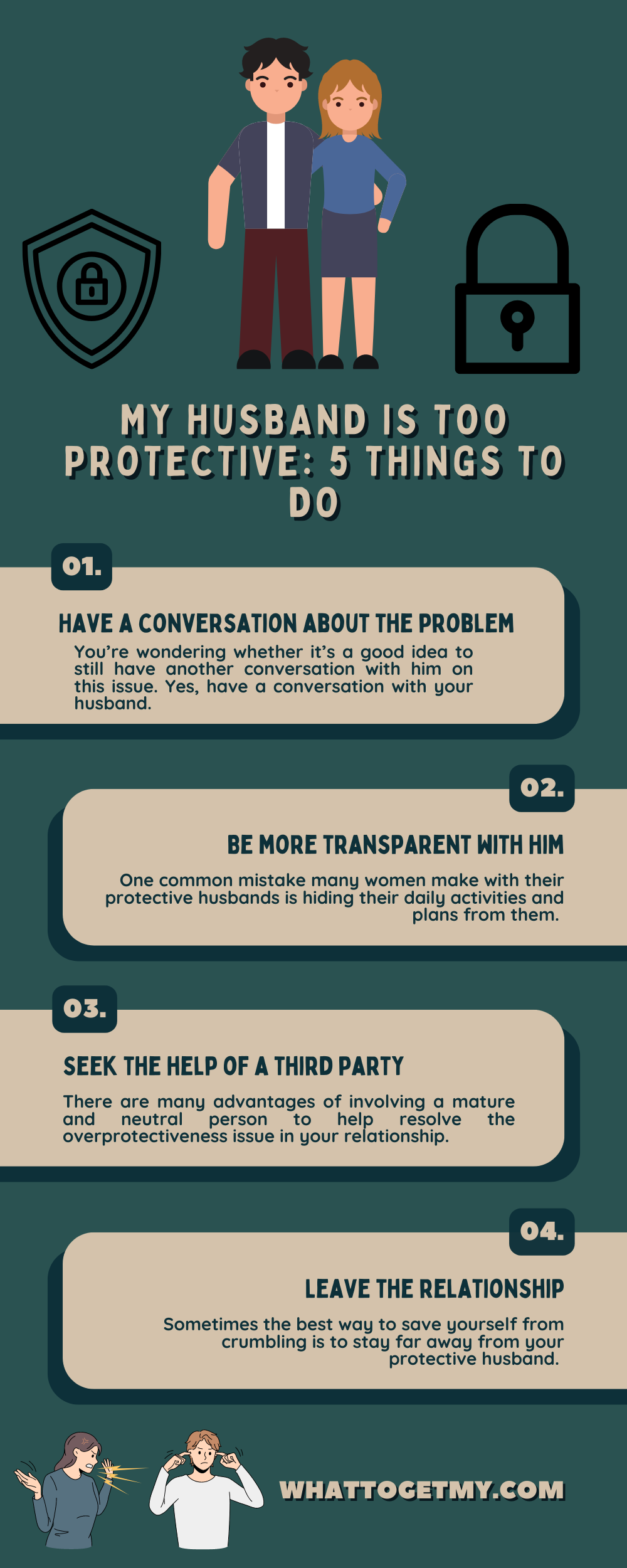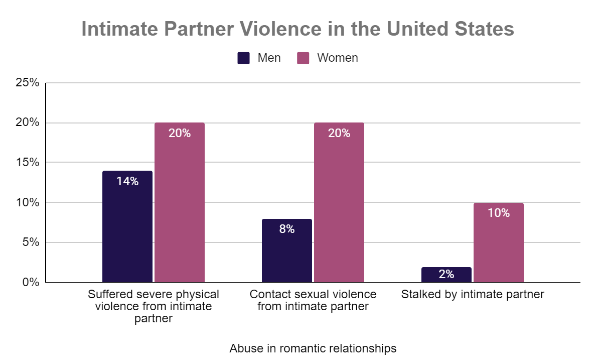My husband is too protective: 5 things to do
WhatToGetMy Instructional Article
- Overprotective spouses are stressful, annoying, and suffocating to be with. Their actions are not only harmful to their partner and relationship but also themselves. In this article, we’ve provided you with 5 things to do when your husband is too protective of you.

An overprotective spouse constantly trades your freedom and happiness for their peace of mind which is wrong.
When people rebrand and glamorize overprotective spouses as the best lovers, they’re being deceptive. It’s either they’ve never been in a relationship with an overprotective partner, have never experienced a healthy and loving relationship, or are guilty of being overprotective in their relationship.
There is nothing fun in being married to someone who watches you like a hawk, questions your every move, and treats you like a child. Every decision you make is a potential quarrel about to happen, and you feel like you’re walking on eggshells around them. Their actions steal your happiness and prevent you from expressing yourself in your marriage. Your joy is traded for theirs, and so is your peace of mind.
It is hard to enjoy marriage with a protective husband. The only way to regain sanity in your home is to address the root cause of your husband’s overprotectiveness as early as possible before it ruins your marriage.
Usually, overprotectiveness is a product of a person’s lack of trust, anxiety, and fear. When a person experiences a heightened level of distrust, anxiety, and fear, they become self-preservative conscious. They wrap themselves and everything they care about in a bubble they consider safe.
There are many reasons why your husband is too protective of you, and we’ve summarized them into three main points;
-
His perception of your strength, fragility, and competence.
Men are instinctively protective or territorial of things and the people they love. The more fragile they perceive what they love to be, the more defensive they are of it. Suppose your husband perceives you as gullible, too trusting, too accessible, overly sensitive, weak to defend or provide for yourself, and indecisive; he might go out of his way to protect you. Sadly, the more he tries to protect you, the more unconscious his actions become, increasing his chances of overstepping your boundary.
If your husband is too protective of you because he evaluates your strengths and weaknesses and lacks confidence in you, he isn’t exactly the villain in your situation. You may have actively encouraged his behavior until it went overboard and encroached on your space. His perception of you may have motivated him to take up unnecessary roles in your life, like, being an overprotective parent or bodyguard, since you gave him the impression that you needed someone to fill these gaps. Thankfully, you can remedy the situation by self-developing and working on how you present yourself.
-
Fear that stems from his perception of your worth in comparison to his.
The second reason your husband is too protective of you is that he has low self-esteem and self-worth issues. Being married to a man with low self-esteem and self-worth is risky when he perceives your worth to be more than theirs. Husbands in this category tend to be possessive because they are easily threatened by men they perceive as potential lovers.
Husbands with low self-esteem and self-worth are potentially dangerous to their spouses and children’s mental and physical well-being. They could go as far as crippling their partner’s self-esteem or self-worth to feel safe in the relationship and even becoming physically violent to tame their wives. By crippling their partner’s self-esteem and self-worth, they hope to achieve a more subservient partner who feels too inferior to consider herself attractive to other men.
Some husbands with low self-esteem also sabotage opportunities for their wives to limit their social exposure. They believe that by reducing their wife’s chances of climbing certain social ladders, they also reduce the chances of their wives leaving them for someone better.
If your husband is too protective because of his self-esteem issues, be proactive in looking after your psychological well-being. Husbands in this category can do anything to protect their ailing egos. The best thing you can do in this situation is to get yourself to safety if he is the violent type, be proactive in nursing your mind and emotions back to health, and encourage your husband to seek professional help.
-
Anxieties from the past.
If your husband has had some traumatic experiences where he suffered the loss of someone he loved or watched them being abused and couldn’t save them, his protectiveness could stem from his fear of relieving the past. He doesn’t want to lose you and fail himself again; therefore, he is resolute in doing everything to shield you. Husbands in this category are extremely suffocating and unreasonable. It’s difficult to quit being overprotective because their actions have become unconscious. Some of them find it difficult to talk about their past or see how it influences their behavior.
The problem with too protective husbands is that they fail to see the long-term effect of their behavior on their wives and marriage. The tighter they hold on to their wives and marriage, the weaker they become. In the end, they end up losing everything they’ve tried so hard to protect for themselves.
What to do when your husband is too protective.
Nursing your marriage back to health won’t come easy. Psychological matters take a longer time to address than many physical ailments. You and your husband need to be intentional and strategic in slashing this issue and be patient to see your efforts rewarded. The process might drive you insane atimes but change is possible if both of you are consistent. Here are a few things that can be done to reduce your husband’s overprotectiveness.
-
Start by rebranding yourself
You might be wondering what rebranding oneself has to do with having a protective husband. After all, it’s him who has the problem and not you. Sometimes, our actions could encourage or influence people’s behaviors. Perhaps there are actions you are unaware of that encourage your husband to be protective of you. Actions likes;
-
Chronic Indecisiveness.
If you can’t take firm and strategic decisions for yourself and the family when it counts, and he finds it difficult to pick your mind on critical issues, you’re giving off the impression that you cannot be relied on. He’ll do all he can to look out for you. Hence, aside from being your husband, he’ll be motivated to be a protective parent who guides his girl, drastically affecting your relationship.
-
Being too emotionally sensitive.
When you are easily pricked emotionally and complain a lot about it to your husband without having any plan to resolve the situation, you give the impression that you are a fragile person that needs saving. What else do you expect him to be than a protective husband to his damsel in distress?
We are not trying to discourage you from confiding in your husband about your eventful day and life. It is necessary to confide in but don’t complain more than you act on resolving your problems. It’s good to give the impression that you are competent and capable of handling your day and interactions in your life without needing him to worry about you.
-
Always the victim in your story.
In addition to showing yourself to be emotionally sensitive, if you are fond of making yourself the victim in every story, you could give off the impression of being weak. Life may not have been fair to you but when you tell your story to your husband, always give a balanced tale instead of always seeking sympathy from him. Understand that life has not been fair to many other people, yet they choose not to play the victim in their story. If your husband has to always feel sorry for you, he might be encouraged to shield you from everything (if he can).
-
Easily manipulated or used by people.
If your husband is too protective of you when you guys hang out with friends or go to functions, it is because he has gotten the impression that you could easily be made fun of, manipulated, or used by people around you. Since he loves you and hates for others to treat you wrongly, he might go out of his way to ensure that you are safe and treated fairly by people. How people treat you because of how they perceive you affect your husband’s reputation and ego. By saving you, he is trying to save himself.
-
Too accessible or promiscuous.
If other men have easy access to you as a married woman for flirtatious conversations and can overstep their boundaries, don’t get surprised if your husband is too protective of you. You are putting your husband in an uncomfortable situation where he may have to defend you to his friends and family. Many women make themselves too accessible to other men to make their husbands jealous. They don’t understand that they are also giving people the wrong impression about themselves. Their actions can also taint their husbands’ reputations.
As a married woman, how you project yourself to the world and your husband matters. How people perceive you to be could rub off on his reputation. You need to start giving the right impression about yourself so that he can drop unnecessary roles he may have taken up in your life. If you are not confident, decisive, temperate, etcetera, it is time to work on yourself and improve your weak areas. Sell yourself well in your marriage by doing the right things and stop being over-dependent on your husband.
-
Have a conversation about the problem.
You’ve probably mentioned the problem to your husband many times, and nothing has changed, and you’re wondering whether it’s a good idea to still have another conversation with him on this issue. Yes, have a conversation with your husband.
It is one thing to complain that your husband is too protective and another thing to have a meaningful and strategic conversation about the problem with him. Complaining about the problem is like poking at a problem and hoping that it bursts and goes away. You place your desire for true change on probability, which is wrong. Whereas having a direct conversation about the problem is you giving your husband a chance to participate in slashing out the problem instead of blaming and leaving him to deal with the problem. Teamwork is needed. Here are things you should consider doing when deciding to have a conversation with your husband about the problem;
- Make a list of everything your husband is doing that you consider too protective and how they affect you before discussing it with him. By organizing your points, you’ll stick to being objective than emotional.
- Prepare your mind for a mature conversation with little complaints, no insults, more patience, and open-mindedness. It will help you set a good tone for the conversation and eliminate any chance of your husband feeling ambushed by it.
- Prepare to listen to your husband without interrupting him until he makes his points. Be the understanding party in the conversation.
- Be humble enough to acknowledge the roles you may have played in his protective behavior.
- Mention the boundaries you want him to respect in your life moving forwards, and be reasonable in your request.
- Emphasize gaining more trust in the relationship and why it will benefit the marriage.
- Pay attention to behaviors he needs you to drop or work on. Those behaviors could be his triggers.
- Try to agree on what’s reasonable and workable in the situation for both of you.
- Focus on making small changes instead of expecting an instant overnight change in behavior from a protective husband.
- Make the whole process of change fun and engaging. Teach yourself signals to use in public when you feel that he is being too protective and you can handle things yourself. Flirt with those signals to lighten the mood. With time, he will learn to give you a chance to stand up for yourself before doing anything to shield you. Learn not to snap
-
Be more transparent with him.
One common mistake many women make with their protective husbands is hiding their daily activities and plans from them. Sadly, pushing a protective husband away and hiding things from him will only make him more suspicious and protective of you.
One way to clear his suspicion is to introduce him to your circle of friends and colleagues. Allow him to evaluate them and encourage him to be less fearful and more open-minded of your friends.
A second way to lessen suspicion is to be transparent with your movements. Keep your husband updated about your movements if you have nothing to hide. Sadly, we cannot act too independently in our marriage. However, if your protective husband wants you to inform him about every single place you go every day, he needs professional help.
Lastly, transparency without complete honesty says you are not reliable or trustworthy. The people you introduce him to should be who you say they are. And be at the places you say you’re at. Don’t give room to doubts.
-
Seek the help of a third party.
It’s not guaranteed that having a meaningful conversation with your protective husband will yield huge changes. You both need people to hold you more accountable. There are many advantages of involving a mature and neutral person to help resolve the overprotectiveness issue in your relationship.
- It guarantees that both of you are more attentive to each other.
- It motivates and encourages both of you to stick to agreed plans.
- It ensures that both you and your husband are fair to each other.
- It could give you guys better insight on how to deal with the situation.
When searching for a third party, go for someone you’ll both find respectable. It could be a private family counselor, a religious mentor, or a respectable figure in your life.
-
Leave the relationship.
If your protective husband is a violent person and is physically violent to you, prioritize your safety before his redemption. Save yourself. You can work things out from a healthy distance and under the supervision of people who want your best interest at heart. Don’t endure abuse when there isn’t any guarantee that he will be changing. Your death should not be his call to order. Save yourself!
If he is not physically violent but is not committed to working on himself, you need to prioritize your mental health, and sometimes the best way to save yourself from crumbling is to stay far away from your protective husband.

Frequently Asked questions.
-
How to act with too protective husband?
- Have a conversation with your protective husband.
- Reassure him of your love before pointing out his errors and your displeasures. This helps you lessen the chances of unpleasant arguments in public or private settings.
- Pay attention to the impression you give your husband that could be encouraging him to be overly protective of you.
- Both of you should agree on gestures to use anytime he’s being overprotective.
- Be more transparent with him.
- Seek counseling.
- If your husband is unyielding to corrections, and you’ve done all you can about the situation, and it’s messing with your mental health, it’s best to leave the relationship.
Final words
A husband who is too protective is bad for your physical and mental well-being, so be proactive in dealing with the situation. Be mindful of the impression you give him, set clear boundaries that should be respected, and seek professional help if need be. If he refuses to change, it’s best to leave the relationship until he works on himself.
20 MINUTES
ESTIMATED TIME DESIGNING AND UPLOADING THIS ARTICLE
10 HOURS 21 MINUTES
ESTIMATED TIME RESEARCHING AND WRITING THIS ARTICLE
You Might Also Like


